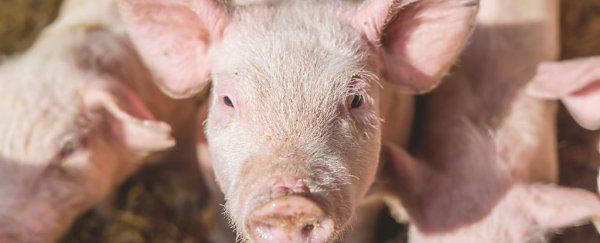Researchers have successfully created embryos in the lab that are part-human, part-pig - creatures known to science as chimeras. It's hoped that these hybrids will one day lead to a sustainable way to grow and harvest transplant organs for patients who would die without them.
Though the plan sounds radical - because it is - the need for donor organs in the US is at an all-time high, with roughly 30 people dying on the waiting list every day. Because of the relentless demand for organs, researchers have been working on making artificial organs or organs from another species a viable option for decades, but one question lingers: is all of this even ethical?
Before we dive into the ethical conversation, let's talk about the new experiment by researchers from the University of California, Davis.
According to Kevin Rawlinson and Nicola Davis at The Guardian, the team combined human induced pluripotent (iPS) stem cells with pig DNA inside a pig embryo. The process involved creating a void in the pig's DNA using the CRISPR gene editing tool, which allowed human stem cells to be inserted and take root to grow into a specific organ.
In this case, the researchers planned on growing a human pancreas inside an otherwise normal pig.
"The human cells would be expected to follow the chemical cues from the pig embryo to develop into different tissues in the foetus," Davis explains. "In most cases, they are outcompeted by the pig embryo's own cells, but in the case of the pancreas there are no pig cells to compete with."
This pig-human embyro was allowed to mature for 28 days before the team terminated it to study the tissue that formed. They found that, at least by the 28-day stage, their part-pig, part-human embryo appeared to be on track to mature into a normal pig with a human pancreas.
"Our hope is that this pig embryo will develop normally but the pancreas will be made almost exclusively out of human cells and could be compatible with a patient for transplantation," the team's leader, Pablo Ross, told the BBC's Fergus Walsh.
In other words, the team thinks that pigs could be used as an incubator to grow human organs with little to no adverse side effects. These pigs would live normal lives - for the most part - despite their unique condition.
While using animals to grow human organs is an intriguing answer to the world's donor problem, it's also the type of thing that science fiction has warned us about for years. After all, just because we can do something, should we?
This question is asked every time researchers perform an experiment of this nature. In fact, the US National Institutes of Health refuses to fund such experiments because of all of these unanswered ethical concerns.
For this experiment in particular, critics are focussing on two questions: will this lead to more animal suffering, and can a transplant patient contract a pig-related disease from the organs?
Let's start with the first. While some could say that a pig's life is a fair trade to save a human's, many disagree, especially if the pig is suffering the entire time the organ is growing inside it.
Peter Stevenson from Compassion in World Farming, an international farm animal welfare organisation, told the BBC:
"I'm nervous about opening up a new source of animal suffering. Let's first get many more people to donate organs. If there is still a shortage after that, we can consider using pigs, but on the basis that we eat less meat so that there is no overall increase in the number of pigs being used for human purposes."
If everything goes the way the team hopes, the pig should live a normal life, unaware of its human organ. The problem is that, at this stage, we won't know if that is true or not until a genetically altered pig is actually born and studied.
The other issue - whether or not humans can catch a disease from the pigs - was seemingly solved last year by a team of scientists from Harvard Medical School who successfully edited a pig's genes to erase 60 copies of retrovirus. In fact, the team's leader, George Church, is actually excited about the new study.
"It opens up the possibility of not just transplantation from pigs to humans but the whole idea that a pig organ is perfectible," Church told the BBC. "Gene editing could ensure the organs are very clean, available on demand and healthy, so they could be superior to human donor organs."
It's important to note that the research is still in its infancy, and the team is still working out the genetics that would make pig donors a reality in the future. There has also been no word on when the team will seek publication in a peer-reviewed journal.
We'll have to wait and see what the future holds for chimeras, but with more and more researchers turning their attention to the issue, we might not have to wait for long.
